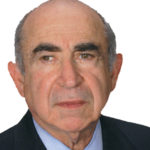2009 Honoree International DI Society’s
W. Harold Petersen Lifetime Achievement Award.
2015 Honoree of NAILBA’s
Douglas Mooers Award for Excellence.
From time to time we will feature an interview with Eugene Cohen, who has dedicated over 57 years of his life to learning, teaching, and supporting brokers in the agency’s quest to help consumers protect their incomes from the tragic effects of a disability. With the help of Victor Cohen, we will chronicle many of Eugene’s life lessons, advice, strategies, and what drives him every day to mentor those who wish to help their clients protect their incomes. Disability insurance is one of those products that can change the trajectory of an individual’s and a family’s life and is crucial for every financial planner and insurance professional to learn about and offer to clients.
This is the fourth part of our ongoing series with Eugene Cohen, CEO and founder of the Eugene Cohen Insurance Agency, Inc. The agency started as a disability insurance brokerage MGA and has grown to over 35 team members who are all focused on the wholesale service needs of financial professionals for disability, life, long term care, and annuities.
Victor: Over our past conversations (published in Broker World’s November 2020, January 2021, and March 2021 issues) you have shared the four types of objections you’ve identified that an advisor may face when discussing individual disability insurance with a client.
Eugene: Those objections being: No Need, No Money, No Hurry, and No Confidence. If a client is hesitant to apply for an individual disability insurance policy I ask myself, “What is the real objection?” “Which one of these four objections am I looking at?”
Victor: Well, let’s focus on just the “no hurry” objection right now. How would you handle that one?
Eugene: If it’s a “no hurry” objection, I have to help the client understand that there is a hurry, because health can change. Accidents take place. We never plan an accident. They happen.
We see accidents and illnesses happening all of the time. Look at Tiger Woods. Did Tiger Woods plan on getting in a serious car accident in California? Or Christopher Reeve, the actor who played Superman–did he plan on getting in a horse-riding accident? Look at actor Michael J. Fox who has Parkinson’s Disease. He first began noticing symptoms of young-onset Parkinson’s Disease at 29 years old. This is life. It is unpredictable. Sometimes an advisor may need to gently remind the client of this reality.
I suggest all advisors visit the website lifehappens.org to read the real-life stories of a doctor, an attorney, a financial planner, business owners…people whose financial lives would have been virtually destroyed had they not had a disability insurance policy when the unexpected happened. These stories are meant to be shared. They need to be heard.
If something does happen, I always say that having an individual disability insurance policy is like having a parachute. It’s always better to have it and not need it…than to need it and not have it.
I don’t have a crystal ball. I don’t know how long a client can wait. And neither does the client. We are offering a product that the client needs now. An individual disability insurance policy is not a luxury item like a piece of jewelry.
Victor: I remember you saying in one of our previous conversations that when the client sees the need for disability insurance, all of the other objections, like the “no hurry” objection, diminish.
Eugene: Exactly. I always say, “Need motivates action.” And the advisor can help a client see the need by asking questions. Victor, what is the longest vacation you’ve ever taken?
Victor: Maybe two or three weeks.
Eugene: Why not longer?
Victor: I need to work.
Eugene: Okay. So, let’s suppose you were out of work for two, three, or four years. You’d have an income problem, right?
Victor: Yes. I would.
Eugene: All of your obligations, the basics—food, clothes, shelter—would not be covered. If you were unable to work for too long your savings could disappear. Your retirement funds could disappear. If you own a home, you could be at risk of losing it because of a mortgage foreclosure. Do you see why it’s so important to protect that income?
Victor: Definitely. I do.
Eugene: We are asset protectors. For most people the ability to earn an income is their greatest asset. When you apply for a mortgage, what’s the most important question on the application?
Victor: They want to know about your income.
Eugene: Right. How about when you want to buy or lease a car?
Victor: Income.
Eugene: You got it.
Victor: So, let’s say the advisor has done their presentation. The client has expressed interest in applying for DI. They understand the need…but they tell the advisor, “I want to think about it.” So, we’re back to the “no hurry” objection.
Eugene: Well, if a client says they want to think about applying for a policy after they’ve already expressed interest in getting coverage, you could ask them, “What exactly do you want to think about it?” Perhaps there is a question I can answer.
Or perhaps you ask the client, “How long do you want to think about it?” They may give you a time frame. I may then say, “Why don’t we do this. You need more than money to buy this policy. We have to see if the company would even accept you. Why don’t we go through with the application and medical exam (if required by the underwriter) and get everything done. If the policy comes down and is approved, we can go over it again. You have said you need the policy, so let’s first see if we can get it for you. How does that sound?”
Victor: What if the client says, “I would like to go over it with my spouse.”
Eugene: Then perhaps I may say, “Why don’t we get the application submitted, get it approved if we can, and then I will go over the policy with both of you so both understand everything on the policy.”
Victor: Underwriting of a policy can take some time, right?
Eugene: Depending on the client’s health and how much information is needed by the underwriters, yes. Because we are talking about protecting many clients’ most valuable asset, I suggest the client get the process started as soon as possible.
Victor: Before we wrap up today’s conversation, I’d really appreciate hearing your thoughts on the “no confidence” objection.
Eugene: The client has to have confidence in the advisor. The client will be potentially spending thousands of dollars on this product over the years.
And how does an advisor gain the confidence of their client? By the advisor showing their knowledge of the product. As the saying goes, “Knowledge is power.”
Victor: I think there may be a belief among some advisors that they have to be a disability insurance expert to discuss the product with clients.
Eugene: I always say that if you prepare for the appointment by reading the illustration and going over the product brochure before the appointment, you will find that it is very easy to understand and present to a client.
A great way to get familiar with disability insurance–to gain perhaps the best product knowledge–is for the advisor to buy a disability income protection policy to protect his or her own income. Some companies even offer discounts for producers.
The first thing I did when I opened up my own agency years ago was purchase additional DI coverage. Besides increasing my individual disability insurance, I purchased a disability business overhead expense policy to cover my office rent. I had a five-year lease. And nowhere in that lease did it say I didn’t have to pay my monthly rent if I were sick or injured and couldn’t work. I was in a hurry to get that disability policy. I saw the need.
Victor: Thank you again for so generously sharing your experience and passion supporting advisors help their clients protect their incomes. I look forward to our next conversation!
Eugene: Thank you, Victor.





























